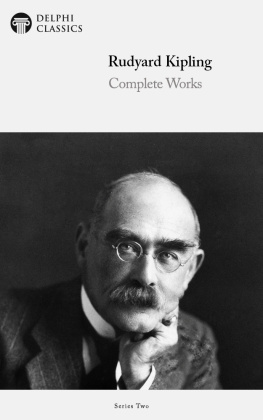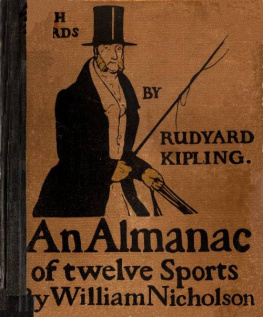With The Night Mail
A Story of 2000 A.D.
Rudyard Kipling
With the Night Mail
A Story of 2000 A.d
At nine o'clock of a gusty winter night I stood on the lower stages of one of the G. P. O. outward mail towers. My purpose was a run to Quebec in "Postal Packet 162 or such other as may be appointed"; and the PostmasterGeneral himself countersigned the order. This talisman opened all doors, even those in the despatchingcaisson at the foot of the tower, where they were delivering the sorted Continental mail. The bags lay packed close as herrings in the long gray underbodies which our G. P. O. still calls "coaches." Five such coaches were filled as I watched, and were shot up the guides to be locked on to their waiting packets three hundred feet nearer the stars.
From the despatchingcaisson I was conducted by a courteous and wonderfully learned officialMr. L. L. Geary, Second Despatcher of the Western Routeto the Captains' Room (this wakes an echo of old romance), where the mail captains come on for their turn of duty. He introduces me to the Captain of "162"Captain Purnall, and his relief, Captain Hodgson. The one is small and dark; the other large and red; but each has the brooding sheathed glance characteristic of eagles and aronauts. You can see it in the pictures of our racing professionals, from L. V. Rautsch to little Ada Warrleighthat fathomless abstraction of eyes habitually turned through naked space.
On the noticeboard in the Captains' Room, the pulsing arrows of some twenty indicators register, degree by geographical degree, the progress of as many homewardbound packets. The word "Cape" rises across the face of a dial; a gong strikes: the South African midweekly mail is in at the Highgate Receiving Towers. That is all. It reminds one comically of the traitorous little bell which in pigeonfanciers' lofts notifies the return of a homer.
"Time for us to be on the move," says Captain Purnall, and we are shot up by the passengerlift to the top of the despatchtowers. "Our coach will lock on when it is filled and the clerks are aboard."
"No. 162" waits for us in Slip E of the topmost stage. The great curve of her back shines frostily under the lights, and some minute alteration of trim makes her rock a little in her holdingdown slips.
Captain Purnall frowns and dives inside. Hissing softly, "162" comes to rest as level as a rule. From her North Atlantic Winter nosecap (worn bright as diamond with boring through uncounted leagues of hail, snow, and ice) to the inset of her three builtout propellershafts is some two hundred and forty feet. Her extreme diameter, carried well forward, is thirtyseven. Contrast this with the nine hundred by ninetyfive of any crack liner and you will realize the power that must drive a hull through all weathers at more than the emergencyspeed of the "Cyclonic"!
The eye detects no joint in her skin plating save the sweeping haircrack of the bowrudderMagniac's rudder that assured us the dominion of the unstable air and left its inventor penniless and halfblind. It is calculated to Castelli's "gullwing" curve. Raise a few feet of that all but invisible plate threeeighths of an inch and she will yaw five miles to port or starboard ere she is under control again. Give her full helm and she returns on her track like a whiplash. Cant the whole forwarda touch on the wheel will sufficeand she sweeps at your good direction up or down. Open the complete circle and she presents to the air a mushroomhead that will bring her up all standing within a half mile.
"Yes," says Captain Hodgson, answering my thought, "Castelli thought he'd discovered the secret of controlling aroplanes when he'd only found out how to steer dirigible balloons. Magniac invented his rudder to help warboats ram each other; and war went out of fashion and Magniac he went out of his mind because he said he couldn't serve his country any more. I wonder if any of us ever know what we're really doing."
"If you want to see the coach locked you'd better go aboard. It's due now," says Mr. Geary. I enter through the door amidships. There is nothing here for display. The inner skin of the gastanks comes down to within a foot or two of my head and turns over just short of the turn of the bilges. Liners and yachts disguise their tanks with decoration, but the G. P. O. serves them raw under a lick of gray official paint. The inner skin shuts off fifty feet of the bow and as much of the stern, but the bowbulkhead is recessed for the liftshunting apparatus as the stern is pierced for the shafttunnels. The engineroom lies almost amidships. Forward of it, extending to the turn of the bow tanks, is an aperturea bottomless hatch at presentinto which our coach will be locked. One looks down over the coamings three hundred feet to the despatchingcaisson whence voices boom upward. The light below is obscured to a sound of thunder, as our coach rises on its guides. It enlarges rapidly from a postagestamp to a playingcard; to a punt and last a pontoon. The two clerks, its crew, do not even look up as it comes into place. The Quebec letters fly under their fingers and leap into the docketed racks, while both captains and Mr. Geary satisfy themselves that the coach is locked home. A clerk passes the waybill over the hatchcoaming. Captain Purnall thumbmarks and passes it to Mr. Geary. Receipt has been given and taken. "Pleasant run," says Mr. Geary, and disappears through the door which a foothigh pneumatic compressor locks after him.
"Aah!" sighs the compressor released. Our holdingdown clips part with a tang. We are clear.
Captain Hodgson opens the great colloid underbodyporthole through which I watch millionlighted London slide eastward as the gale gets hold of us. The first of the low winter clouds cuts off the wellknown view and darkens Middlesex. On the south edge of it I can see a postal packet's light ploughing through the white fleece. For an instant she gleams like a star ere she drops toward the Highgate Receiving Towers. "The Bombay Mail," says Captain Hodgson, and looks at his watch. "She's forty minutes late."
"What's our level?" I ask.
"Four thousand. Aren't you coming up on the bridge?"
The bridge (let us ever bless the G. P. O. as a repository of ancientest tradition!) is represented by a view of Captain Hodgson's legs where he stands on the control platform that runs thwartships overhead. The bow colloid is unshuttered and Captain Purnall, one hand on the wheel, is feeling for a fair slant. The dial shows 4,300 feet.
"It's steep tonight," he mutters, as tier on tier of cloud drops under. "We generally pick up an easterly draught below three thousand at this time o' the year. I hate slathering through fluff."
"So does Van Cutsem. Look at him huntin' for a slant!" says Captain Hodgson. A foglight breaks cloud a hundred fathoms below. The Antwerp Night Mail makes her signal and rises between two racing clouds far to port, her flanks bloodred in the glare of Sheerness Double Light. The gale will have us over the North Sea in half an hour, but Captain Purnall lets her go composedlynosing to every point of the compass as she rises.
"Five thousandsix, six thousand eight hundred"the dipdial reads ere we find the easterly drift, heralded by a flurry of snow at the thousandfathom level. Captain Purnall rings up the engines and keys down the governor on the switch before him. There is no sense in urging machinery when olus himself gives you good knots for nothing. We are away in earnest nowour nose notched home on our chosen star. At this level the lower clouds are laid out all neatly combed by the dry fingers of the East. Below that again is the strong westerly blow through which we rose. Overhead, a film of southerly drifting mist draws a theatrical gauze across the firmament. The moonlight turns the lower strata to silver without a stain except where our shadow underruns us. Bristol and Cardiff Double Lights (those statelily inclined beams over Severnmouth) are dead ahead of us; for we keep the Southern Winter Route. Coventry Central, the pivot of the English system, stabs upward once in ten seconds its spear of diamond light to the north; and a point or two off our starboard bow The Leek, the great cloudbreaker of Saint David's Head, swings its unmistakable green beam twentyfive degrees each way. There must be half a mile of fluff over it in this weather, but it does not affect The Leek.












